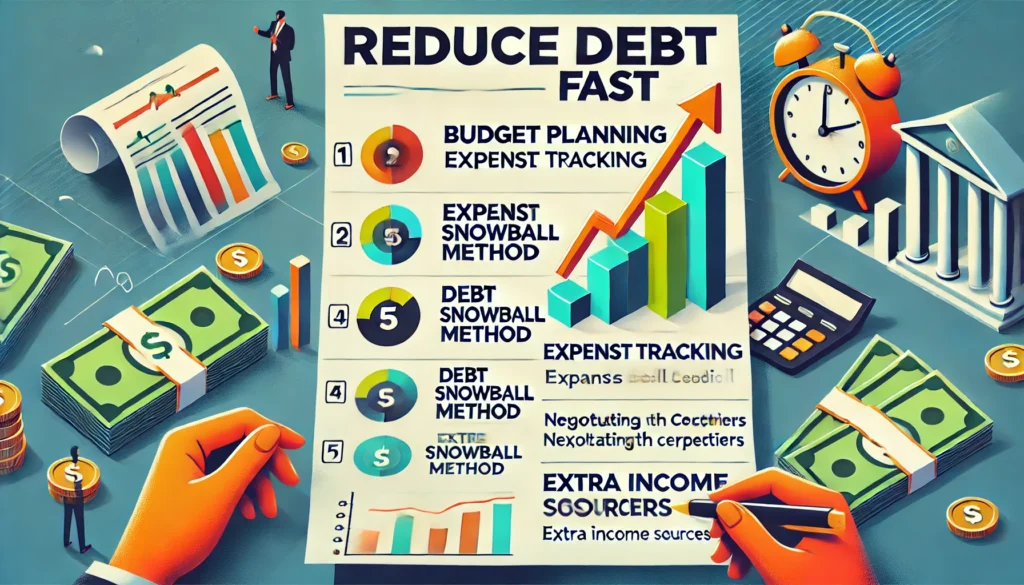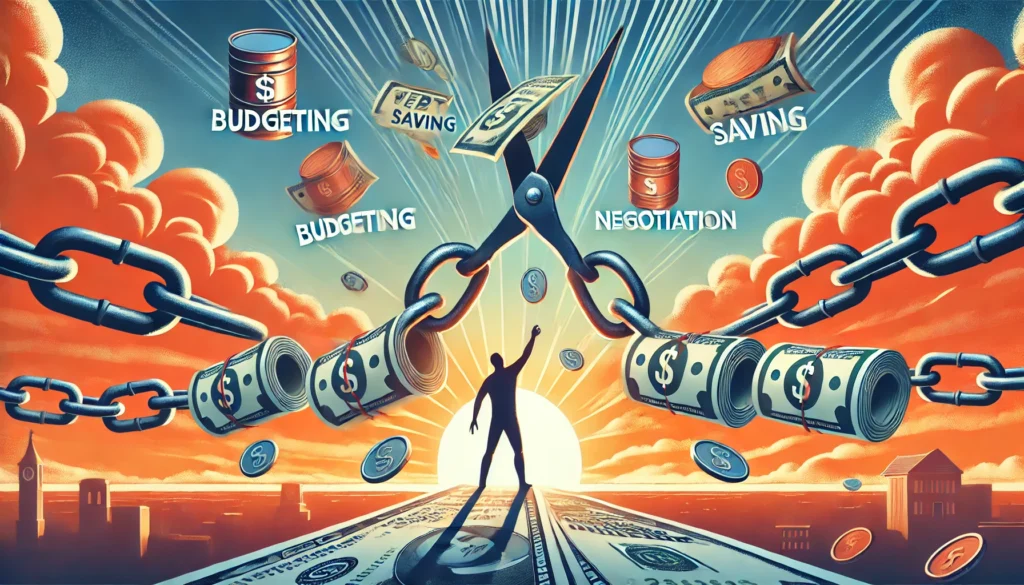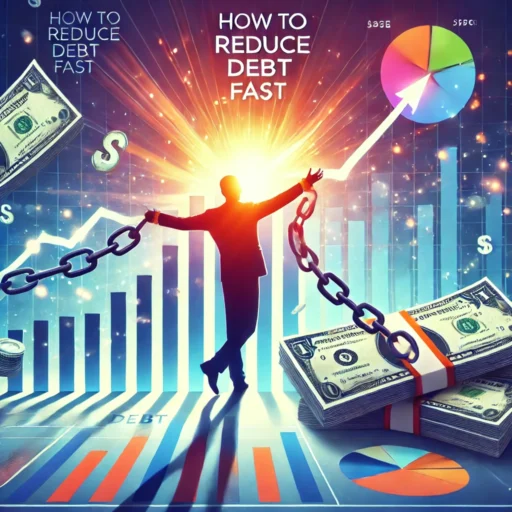A comprehensive Guide

How to Reduce Debt Fast will provide you with practical, easy-to-follow steps to help you get out of debt faster than you thought possible. Debt can feel like a heavy weight on your shoulders, but the good news is that it doesn’t have to be permanent. With the right strategies, you can reduce your debt quickly and take control of your financial future. Whether you’re dealing with credit card debt, student loans, or personal loans.
Understand Your Debt:
The first step to reducing debt is understanding exactly what you owe. Many people avoid looking at their debt because it feels overwhelming, but facing it head-on is the only way to tackle it effectively. Start by making a list of all your debts, including:
- Credit card balances
- Student loans
- Car loans
- Personal loans
- Medical bills
- Any other outstanding debts
For each debt, note the total amount owed, the interest rate, and the minimum monthly payment. This will give you a clear picture of your financial situation and help you prioritize which debts to pay off first.
Create a Budget:
A budget is your roadmap to financial freedom. It helps you track your income and expenses, so you can see where your money is going and identify areas where you can cut back. Here’s how to create a simple budget:
- List your monthly income: Include your salary, side hustle income, and any other sources of money.
- List your monthly expenses: Include fixed expenses like rent, utilities, and loan payments, as well as variable expenses like groceries, entertainment, and dining out.
- Subtract your expenses from your income: The goal is to have money left over that you can use to pay down your debt.
If you find that your expenses are higher than your income, look for ways to cut back. For example, you could cancel unused subscriptions, cook at home instead of eating out, or find cheaper alternatives for everyday items.
Prioritize Your Debts:
Not all debts are created equal. Some have higher interest rates, which means they cost you more money over time. To reduce your debt fast, focus on paying off high-interest debts first. There are two popular methods for prioritizing debt:
- The Debt Avalanche Method: With this method, you focus on paying off the debt with the highest interest rate first, while making minimum payments on the others. Once the highest-interest debt is paid off, you move on to the next highest, and so on. This method saves you the most money on interest in the long run.
- The Debt Snowball Method: With this method, you focus on paying off the smallest debt first, regardless of the interest rate. Once the smallest debt is paid off, you move on to the next smallest, and so on. This method can give you quick wins and keep you motivated.
Choose the method that works best for you, and stick to it.
Increase Your Income:
If you’re serious about reducing debt fast, finding ways to increase your income can make a big difference. Here are some ideas:
- Take on a side hustle: Consider freelancing, driving for a rideshare service, or selling items you no longer need.
- Ask for a raise: If you’ve been at your job for a while and have taken on additional responsibilities, it might be time to ask for a raise.
- Sell unused items: Go through your home and sell items you no longer use, such as clothes, electronics, or furniture.
Any extra money you earn should go directly toward paying down your debt.
Cut Unnecessary Expenses:
Reducing your expenses is just as important as increasing your income. Take a close look at your spending habits and identify areas where you can cut back. Here are some common areas where people overspend:
- Dining out: Cooking at home is usually much cheaper than eating out.
- Entertainment: Look for free or low-cost activities, such as hiking, visiting a museum, or having a game night at home.
- Subscription services: Cancel any subscriptions you don’t use regularly, such as streaming services, gym memberships, or magazine subscriptions.
By cutting back on unnecessary expenses, you’ll free up more money to put toward your debt.
Negotiate Lower Interest Rates:

High-interest rates can make it difficult to pay off debt quickly. If you have good credit, you may be able to negotiate lower interest rates with your creditors. Here’s how:
- Call your credit card company: Explain your situation and ask if they can lower your interest rate. If you’ve been a loyal customer with a good payment history, they may be willing to work with you.
- Consider a balance transfer: If you have credit card debt, you may be able to transfer your balance to a card with a lower interest rate. Many credit cards offer 0% introductory APR for a limited time, which can help you save on interest and pay off your debt faster.
Use Windfalls Wisely:
If you receive a windfall, such as a tax refund, bonus, or inheritance, resist the urge to splurge. Instead, use the money to pay down your debt. Even a small windfall can make a big difference in reducing your debt faster.
Avoid Taking on New Debt:
While you’re working on paying off your existing debt, it’s important to avoid taking on new debt. This means:
- Stop using credit cards: If you’re trying to pay off credit card debt, stop using your cards until you’ve paid them off.
- Avoid unnecessary loans: Think carefully before taking out a new loan, even if it’s for something you want, like a new car or a vacation.
By avoiding new debt, you’ll be able to focus all your efforts on paying off your existing debt.
Consider Debt Consolidation:
If you have multiple debts with high-interest rates, debt consolidation may be a good option. Debt consolidation involves taking out a new loan to pay off your existing debts, leaving you with just one monthly payment. This can simplify your finances and potentially lower your interest rate, making it easier to pay off your debt faster.
However, debt consolidation isn’t right for everyone. Be sure to do your research and consider the pros and cons before deciding if it’s the right choice for you.
Stay Motivated:
Reducing debt takes time and effort, and it’s easy to get discouraged along the way. To stay motivated:
- Set small, achievable goals: Instead of focusing on paying off all your debt at once, set smaller goals, such as paying off a specific credit card or reducing your debt by a certain amount.
- Celebrate your progress: When you reach a milestone, take a moment to celebrate your success. This will help keep you motivated to continue.
- Remind yourself of the benefits: Imagine how good it will feel to be debt-free. Whether it’s the ability to save for a dream vacation, buy a home, or simply live without the stress of debt, keeping your end goal in mind can help you stay focused.
Seek Professional Help if Needed:
If you’re struggling to manage your debt on your own, don’t be afraid to seek professional help. A credit counselor can help you create a debt management plan and negotiate with your creditors on your behalf. Just be sure to choose a reputable credit counseling agency, as there are scams out there.
Stay Committed to a Debt-Free Lifestyle:
Once you’ve paid off your debt, it’s important to stay committed to a debt-free lifestyle. This means:
- Continuing to budget: Even after your debt is paid off, sticking to a budget will help you avoid falling back into debt.
- Building an emergency fund: Having an emergency fund can help you cover unexpected expenses without relying on credit cards or loans.
- Saving for the future: Start saving for your long-term goals, such as retirement, a down payment on a home, or your children’s education.
Recommended: How to Invest in Stocks for Beginners
Conclusion
Reducing debt fast is possible with the right strategies and a commitment to change. By understanding your debt, creating a budget, prioritizing your payments, and finding ways to increase your income and cut expenses, you can take control of your financial future. Remember, the journey to becoming debt-free may not be easy, but it’s worth it. Stay focused, stay motivated, and before you know it, you’ll be living a debt-free life.
